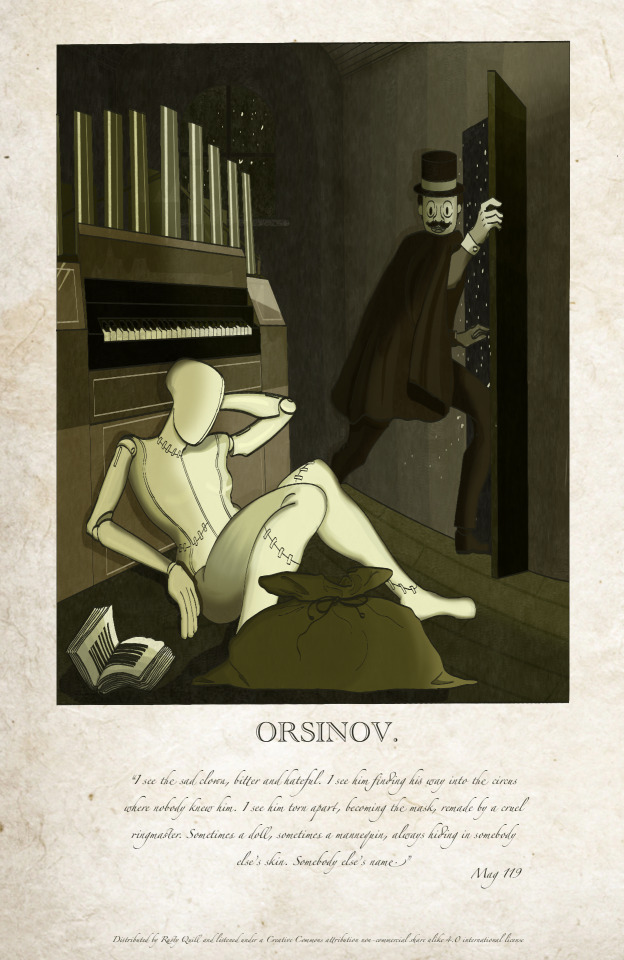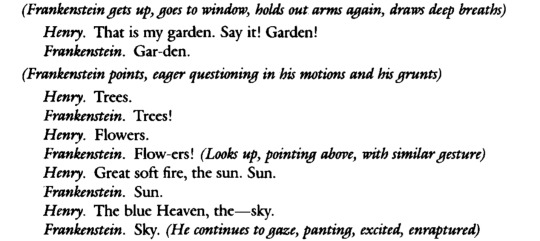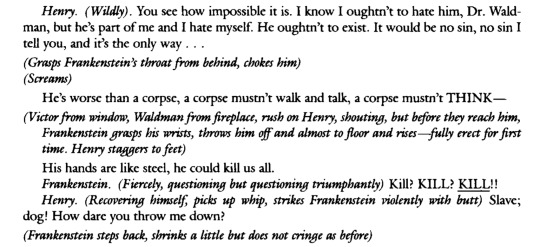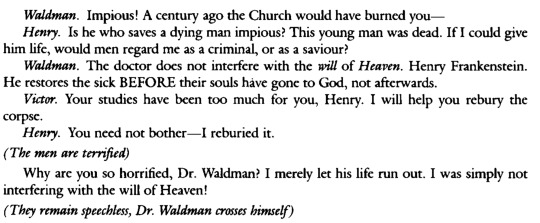#unlike Frankenstein he’s not a weakling who runs out on his creation
Text

Throwing ‘Frankenstein but make it Nikola Orsinov’ onto the internet for my enrichment. Something something ✨ wooooow so you’re both like non-human beings made from the remains of others? craaazyyy ✨
This drawing is specifically based off of this poster:

#I know a bunch of people think Jekyll and Hyde are the most stranger appropriate but like#let me have this one okay#(personally I think j&h is the spiral but that’s just a ✨me✨ thing)#god this sucked to draw#the lineart was fine#but the shading was originally meant to be crosshatch like the poster#and I CANNOT do crosshatch so I just gave up and made it green#for the vibe#the magnus archives#art#nikola orsinov#the stranger#gregor orsinov#he’s supposed to be smiling but idk if it came across#unlike Frankenstein he’s not a weakling who runs out on his creation#the virgin Frankenstein vs the chad Orsinov#magieart#should I tag Frankenstein?#eh why not#frankenstein or the modern prometheus
61 notes
·
View notes
Text
Frankenstein (1930) - John Balderston
Frankenstein (1930) is a curious play. I came across it at the end of Steven Forry's "Hideous Progenies" along with the other scripts. This play was an adaptation of another Frankenstein play by Peggy Webling, and the 1931 James Whale film was loosely based off of it- a bit more on that at the end of the post.
The play swaps the roles of Henry and Victor, with Henry Frankenstein as the mad scientist and Victor Moritz as the literary-inclined childhood friend. Dr Waldman also gets a much larger role and is there throughout the play.


[id: Victor: (Forgets in his enthusiasm that he was going, comes down stage toward Waldman). I know nothing of science. The best I can hope is to write his biography when he’s famous, if he doesn’t kill himself with overwork. Waldman: (amused). And what will you say? Victor: I’ll tell how we played together beside the lake at Belrive, how he was always looking for the philosopher’s stone, read books on alchemy when he was thirteen and talked about turning base metal into gold. Waldman: He has deserted his alchemy for the new facts, new experimental truths. They fascinate me as a man of science, though sometimes they terrify me as a priest. end id]
[id: Victor: No, it was Amelia. We had been engaged since we were children - last year she - well she said she loved Henry. Waldman: (Gently). Are you giving up everything to your friend? Victor: (Vehemently). No. Why shouldn’t she want him? He has brilliance, he has strength, he will be a great man. I am a weakling- Waldman: He has some uncanny power- (Noise of bolt shooting in door R, door opens. Enter Henry. Young, thin, nervous, good looking but now at the point of hysteria. He crosses rapidly to them.) end id]
The play's creature is much less eloquent than his novel's counterpart, though he's not a mindless animal. He learns and is capable of basic speech, and understands far more language than he is capable of formulating himself. He is also shown to have learned how to read. The creature is drawn to and appreciates beauty, and is shown to like the sight of nature, the sun, women, domestic white doves, and shimmering water. He has difficulty understanding some concepts such as death, and the different ways to cause death, and has trouble controlling his own strength. The creature is actually referred to by the main characters as "Frankenstein," and there is an explanation given for this in the text.


[id: (Frankenstein gets up, goes to window, holds out arms again, draws deep breaths). Henry: That is my garden. Say it! Garden! Frankenstein: Gar-den. (Frankenstein points, eager questioning in his motions and his grunts). Henry: Trees. Frankenstein: Trees! Henry: Flowers. Frankenstein: Flow-ers! (Looks up, pointing above, with similar gesture). Henry: Great soft fire, the sun. Sun. Frankenstein: Sun. Henry: The blue Heaven, the sky. Frankenstein: Sky. (He continues to gaze, panting, excited, enraptured.) end id]
[id: Frankenstein: No man touch Frankenstein - fear. Hit Frankenstein. Master beat - not now. I kill! You woman, you not hate? Katrina: You mean people hate you? Frankenstein: Hate Frankenstein. All people. Hurt Frankenstein. Katrina: I don’t hate you, my poor friend. Frankenstein: Friend? Katrina: Don’t you know what friend is either? Somebody one’s fond of. I should like to help you. Frankenstein: You woman, you beauty like... like garden. Like sky. No pain like... like other woman. Katrina: I don’t understand you. end id]
Upon creating the creature, instead of abandoning him, Henry locks him up in his lab and treats him cruelly. The creature eventually escapes and, like in the novel, is rejected by society, goes on to commit multiple murders, and eventually arrives at the house of Frankenstein where he asks his creator for a female companion. While he is at the house, he accidentally kills Henry's sister, Katrina. Out of fear for the safety of his fiance, Henry agrees to make a second creature and sequesters himself in a hut in the mountains, where he sets up a lab. The ending somewhat differs to the novel - Henry's friends find him in his hut, and there is a final violent conflict in which both the creator and the creature die. However, both Victor (the childhood friend) and Amelia (the fiance) survive the story, unlike in the novel.
I found the change in ending interesting. Henry's character by the end does not have the loneliness and haunted aspects that novel Victor's did, and his hatred of the creature did not seem to initially be born from fear, though he did feel disgust towards his creation. Though the creature has killed people, the only person he's harmed by the end of the play who Henry knows personally is his sister. Henry does not go on the final chase for the creature in the end, but dies at his creations hands. The creature has some sort of religious revelation and is killed by an act of god, being struck by lightning after calling upon him.

[id: Waldman: Pain - that kind of pain is not felt by animals, it comes from the soul. Even when you killed him, you felt pain - (points to corpse on the floor). Yet you - I do not understand. Frankenstein: Soul - what is soul? Waldman: It is the part of God he gives to every man who lives. It is the part of man God calls back to himself after man dies. (Frankenstein murmurs: not man.) That’s why I’m not afraid to die. You can kill the body, but not the soul. Katrina is with God; I think that after all he suffered, Henry’s spirit is with God too. Frankenstein: Where is God? I thought he - (points to Henry) God - my God. Waldman: (Holds crucifix up). No - God is here. Here - everywhere. Frankenstein: Your God hate - Waldman: God loves the birds, the beasts, as well as men. Frankenstein: Love Frankenstein? Waldman: Yes. Whatever you are, you have taught me, a priest, something about God. He loves you. Frankenstein: He - friend? Waldman: Yes. end id]
Like the novel's Victor, this Henry is self-interested, arrogant, and snubs his friends and family without thought, but is also more prone to fight over flight, unlike the other Victor. I found him more flat and less relatable, but I think part of it is the format - characters in a play tend to be more one dimensional compared to a novel, because a play lacks the ability and run-time needed to deeply immerse the reader in the character's rich inner thoughts and details. Because the play starts soon before the creature is brought to life, we did not get to experience Henry's early life or truly understand his reasons for creating the creature.

[id: Henry: (Wildly). You see how impossible it is. I know I oughtn’t to hate him, Dr Waldman, but he’s part of me and I hate myself. He oughtn’t to exist. It would be no sin, no sin I tell you, and it’s the only way... (Grasps Frankenstein’s throat from behind, chokes him). (Screams). He’s worse than a corpse, a corpse mustn’t walk and talk, a corpse mustn’t think - (Victor from window, Waldman from fireplace, rush on Henry, shouting, but before they reach him, Frankenstein grasps his wrists, throws him off and almost to the floor and rises - fully erect for first time. Henry staggers to feet). His hands are like steel, he could kill us all. Frankenstein: (Fiercely, questioning but questioning triumphantly). Kill? Kill? Kill!! Henry: (Recovering himself, picks up whip, strikes Frankenstein violently with butt). Slave; dog! How dare you throw me down? (Frankenstein steps back, shrinks a little but does not cringe as before). end id]
The play contains much more heavy-handed religious references than the novel, usually relating to Henry's transgressions and the creature's existence. Because Victor and Waldman learn about the creature early on, they are able to have multiple onstage discussions about it, often entailing arguments on the nature of life and souls and their relationship to god. I believe part of the heavy-handedness can also be attributed to the format as well - the play doesn't have very long to deliver its key themes and cannot use long-winded and nested narratives like the novel, and it must deliver almost everything through dialogue. Therefore, like the characters, the play's themes are also shallower in comparison to the novel. It could be that the writer shifted the focus of the play more strongly onto religious themes to make up for this, though it could also be because of the time in which it was written. I admit, thematic analysis is not my strong suit and most people could probably pull more to analyze out of this play than I could.


[id: Waldman: Impious! A century ago the Church would have burned you - Henry: Is he who saves a dying man impious? This young man was dead. If I could give him life, would men regard me as a criminal, or as a saviour? Waldman: The doctor does not interfere with the will of Heaven, Henry Frankenstein. He restores the sick before their souls have gone to God, not afterwards. Victor: Your studies have been too much for you, Henry. I will help you rebury the corpse. Henry: You need not bother - I reburied it. (The men are terrified). Why are you so horrified, Dr. Waldman? I merely let his life run out. I was simply not interfering with the will of Heaven! (They remain speechless, Dr Waldman crosses himself). end id]
[id: Waldman: Enough of this. Henry: (Hysterically). You can’t have it both ways, priest! If this thing that I made has no soul, is not human, it’s a beast, and a beast can be killed without sin! Waldman: Who am I to know what relation God has decreed between you and this thing that you and the Devil, your rays and your Elixir brought into the world? But it is linked to you more strongly than son to father. And this I know, that it is part of yourself and that you cannot destroy the unholy life that you have dared to breathe into that body. Henry: then it will destroy me. Waldman: (Turns away, Henry’s remark strikes him deeply and he seems to agree, as he turns back to Henry). This is in God’s providence. end id]
Authorship & history
The play is written by John Balderston, published 1930. According to Hideous Progenies, this is an adaptation of Peggy Webling's 1927 "Frankenstein: An Adventure in the Macabre," and was meant for Broadway. The rights to it and to Webling's script were purchased by Universal Studios and after much revision, it resulted in the script for Frankenstein (1931).
I have not been able to find Webling's script and therefore cannot specifically identify what in Balderston's script is from Webling's work and what is his own. According to Hideous Progenies, the names Victor Moritz and Henry Frankenstein are from Webling's play, as well as Dr Waldman's extended involvement, and the creature being called "Frankenstein."
I was not able to find anything else online about this play except for brief mentions on some Wikipedia pages, so if anyone knows of other sources on either of them or knows of where I could read An Adventure in the Macabre, I'd be glad to hear it.
Sources:
Hideous Progenies: Dramatizations of Frankenstein from Mary Shelley to the Present - by Steven Earl Forry (1990)
Wikipedia pages for John Balderston, Peggy Webling, and Frankenstein (1931)
#frankenstein#frankenstein 1930#posts about media#victor frankenstein#henry clerval#henry frankenstein#victor moritz#doctor waldman#plays#my posts#not art#media review#writeup#this thing has been in my drafts for 2 weeks its time to set it free#my writing
0 notes